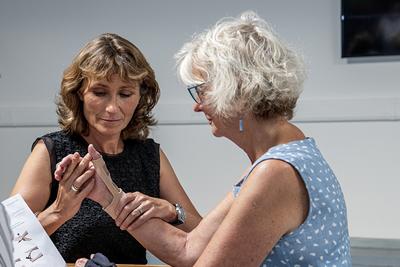FortisNet’s outgoing Director reflects on her three-year term at the helm

FortisNet Director Professor Jo Adams is handing over the reins of the interdisciplinary network in musculoskeletal health as her three-year term as lead comes to an end.
Jo was appointed as the first Director of FortisNet that was set up by the Institute for Life Sciences (IfLS) to bring together clinical, academic and Industrial partners to develop research, products and services that will transform musculoskeletal health. The network aims to improve lives by delivering better treatments, increasing the speed to market of musculoskeletal-focused technology and training the next generation of scientists and engineers.
Jo reflects on what has been achieved to date. She said: “It has been exciting to help realise the potential of interdisciplinary teams working collaboratively to achieve solutions to today’s healthcare challenges.
“The FortisNet regional network has terrific personnel, skills and expertise across a variety of academic, clinical and industrial settings within musculoskeletal health, and it has been my privilege to work alongside these people – many of whom are among the brightest individuals working within musculoskeletal health in the UK.
“Together we have been striving to make the lives of individuals living with musculoskeletal conditions better and have contributed to stimulating industrial partnerships, business opportunities and economic growth within the region.
“We are proud to have targeted and developed the platform of collaborative working – across disciplines, institutions and boundaries to ensure that engineering, clinical and scientific innovation in musculoskeletal health is developed collaboratively with patients to be relevant and feasible to implement swiftly within health settings.
“We have also worked hard to engage patients and clinicians as end users and ensure that they are now a key part of FortisNet.
“The network is now securely set to fully realise the impact of working alongside industry and optimising the grants and impact that this can offer in this area of research.”
Professor Peter JS Smith, Director of the IfLS, will also be taking on the role of FortisNet Director. He added: “I would like to thank Jo for all her hard work, vision and leadership of the FortisNet network. She has set a firm foundation for the network particularly embedding the philosophy of ‘ask the end user first’. This resonates throughout the innovation network and sets an invaluable precedent for the community.”
Jo will now focus on her own team’s research in musculoskeletal health, continuing to support NHS clinicians and new researchers to implement world leading research. This will build on the established platform for which she has recently received international recognition for the part she played in an innovative trial to improve the lives of people with hand and upper limb rheumatoid arthritis (RA) across the UK.
As Professor of Musculoskeletal Health, Jo was part of a team of academics and clinical NHS staff whose clinical research – the SARAH programme - was named as one of the world’s top five evidence-based research papers from the last five years by the international Physiotherapy Evidence Database (PEDro).
PEDro is a free database of more than 44,000 randomised trials, systematic reviews and clinical practice guidelines in physiotherapy. To celebrate their 20th anniversary they identified five of the most important physiotherapy randomised controlled trials that have been published between 2014 and 2019. The top five were selected by an international panel of physiotherapy clinical trialists as it was felt they had answered important clinical questions in a robust and innovative way.
The SARAH research programme focused on strengthening and stretching for RA of the hand, and brought academics from Southampton, Warwick, Oxford and University College London, together with physiotherapists and occupational therapists from 17 NHS Trusts.
The team designed and developed an exercise programme for patients with RA in their hands that included specific strategies to increase motivation and adherence to the programme including a specific commitment from the participants to carry out exercises in their own homes.
The research findings showed that the addition of an exercise regime delivered by an experienced therapist was more effective in restoring and retaining hand function in RA, and had a positive effect on the daily living, work and physical and emotional roles of the participants than best practice usual care. It also showed that the enhanced programme was cost-effective for the NHS.
Jo said: “The team was thrilled with the recognition of being named as one of the top five research papers in the world by PEDro. Southampton students immediately benefited from this research as I was immediately implementing the trial findings as they were being reported into the teaching of our occupational therapy and physiotherapy students.
“This meant that our students were getting direct access to state-of-the-art evidence-based teaching around research relating to contemporary national trials.”
The exercise programme, developed as part of the SARAH programme, is now freely available to all NHS therapists across the UK for their treatment of patients with painful RA hands, and a web-based resource has been developed to make the programme more accessible to a wide range of people living with painful RA hands. The trial’s findings also contribute to NICE guidelines.